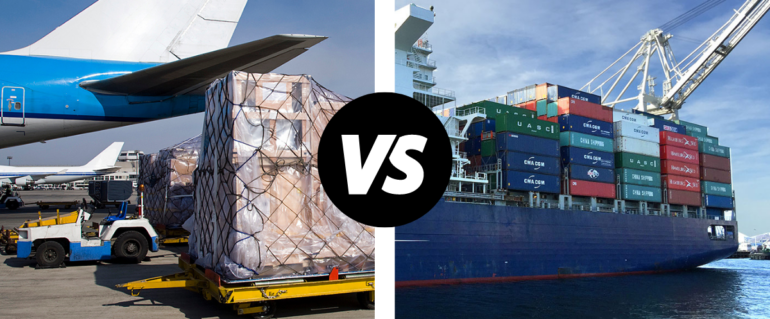When planning to ship goods long distances, internationally, or to remote locations, you may hear two options: air freight forwarding and ocean freight forwarding. Each has advantages and disadvantages, and choosing the right one depends on various factors. In this blog, we will look at air freight forwarding and ocean freight forwarding and see which would work best to ship your goods.
Air Freight Forwarding
Air freight forwarding, also known as air cargo shipping, transports goods by airplane. This method is typically used for high-value, time-sensitive, or perishable goods. Air freight forwarding is faster than ocean freight forwarding, with delivery times ranging from a few hours to a few days. It is considered more secure, as airports have strict security measures and more stringent hazardous materials requirements. Air freight forwarding also gets those goods to remote locations where ships and other land transport cannot.
One thing to consider with air freight forwarding is its cost and that speedy delivery comes at a premium. It is generally more expensive than ocean freight forwarding due to the higher fuel cost and the limited space on airplanes. Additionally, air freight forwarding is not always suitable for oversized, large, or heavy goods, as airplanes’ weight and size restrictions are more stringent than those on ships.
Ocean Freight Forwarding
Ocean freight forwarding, also known as sea cargo or sea freight shipping, transports goods by sea via large cargo ships. This method is typically used for large and heavy goods, such as machinery, vehicles, and bulk commodities. Ocean freight forwarding is usually slower than air freight forwarding, with delivery times ranging from just days to weeks or months, depending on the route. It is also a much cheaper shipping method because ships have more space, so shipper fuel cost share is lower than on airplanes.
One of the main disadvantages of ocean freight forwarding is its lack of security. While ports have security measures in place, they are not as strict as those at airports. Additionally, ocean freight forwarding may not be the best for time-sensitive or perishable goods, as the longer transit times can result in spoilage or damage unless packed in specialized containers, so plan ahead if special considerations will be needed.
Comparing Air Freight Forwarding and Ocean Freight Forwarding
When deciding between air freight forwarding and ocean freight forwarding, it is essential to consider the specific needs of your shipment. Air freight forwarding may be the best option to transport high-value, time-sensitive, or perishable goods. However, if you need to transport large or heavy goods, or if cost is a significant factor, ocean freight forwarding may be the better choice, although slower.
Both air freight and ocean freight forwarding are an integral part of Alaska’s shipping industry. By understanding both, you can choose what’s best for your shipment. Contact Alaska Air Forwarding to learn more about our air freight services or to get a quote for your shipment.






